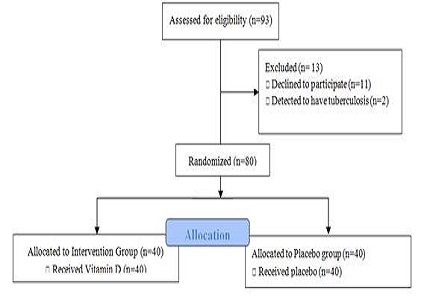Randomized controlled trial of the impact on the outcome of pneumonia in children receiving Vitamin D supplementation
Abstract
Objective: To study whether vitamin D supplementation in children presenting with pneumonia and severe pneumonia reduce its duration of recovery.
Study design: Randomized, Double blind, Placebo-controlled trial.
Setting: Paediatric unit of a Teaching hospital.
Methods: 80 children between 2 months-5years with diagnosis of pneumonia and severe pneumonia (as per the WHO definition) admitted over a period of one year were included. Children with features of rickets, severe malnutrition, history of asthma, any underlying medical disorders and vitamin D supplementation over the last 12months were excluded. Children were randomized to two groups, Intervention group received 300,000 IU of Vitamin D (1ml) and the control group received 1ml of Sterile water as a placebo intramuscularly along with antibiotics and supportive care. Children were monitored for the resolution of symptoms. The two groups were comparable for baseline demographic, socioeconomic, clinical and laboratory parameters.
Results: There was no significant difference in time to resolution of symptoms (fever, tachypnea and chest retractions) in Intervention group (3.63±1.27 days) & placebo group (3.6±0.78 days), p=0.933).
Conclusion: Supplementation of single high dose (300,000 IU) of vitamin D given intramuscularly have no beneficial effect on the resolution of pneumonia and severe pneumonia in the children of 2 months to 5years of age.
Downloads
References
2. Rudan I, Boschi-Pinto C, Biloglav Z, Mulholland K, Campbell H. Epidemiology and etiology of childhood pneumonia. Bull World Health Organ. 2008;86:408-16.
3. Muhe L, Lulseged S, Mason K, Simoes E. Case-control study of the role of nutritional rickets in the risk of developing pneumonia in Ethiopian children.Lancet.1997;349:1801-4. [PubMed]
4. Haugen J, Basnet S, Hardang I, Sharma A, Mathisen M, Shrestha P et al. Vitamin D status is associated with treatment failure and duration of illness in Nepalese children with severe pneumonia. Pediatr Res. 2017;82:986-93.
5. McNally J, Leis K, Matheson L, Karuanayake C. Vitamin D deficiency in young children with severe acute lower respiratory infection. Pediatr Pulmonol.2009;44:981-8.
6. White JH. Vitamin D signaling, infectious diseases, and regulation of innate immunity. Infect Immun. 2008 Sep;76(9):3837-43. doi: 10.1128/IAI.00353-08. Epub 2008 May 27.
7. Wayse V, Yousafzai A, Mogale K, Filteau S. Association of Subclinical vitamin D deficiency with severe acute lower respiratory infection in Indian children under 5y. Eur J Clin Nutr.2004;58:563-7.
8. Karatekin G, Kaya A, Salihoğlu O, Balci H, Nuhoğlu A. Association of subclinicalvitamin D deficiency in newborns with acutelowerrespiratory infection and their mothers. EurJClinNutr. 2009 Apr;63(4):473-7. Epub 2007 Nov 21.
9. Walker VP, Modlin RL. The vitamin D connection to pediatric infections and immune function. Pediatr Res. 2009 May;65(5 Pt 2):106R-113R. doi: 10.1203/PDR.0b013e31819dba91. [PubMed]
10. Sichert-Hellert W, Wenz G, Kersting M. Vitamin intakes from supplements and fortified food in German children & adolescents: results from the DONALD study. J Nutr.2006;136:1329-33.
11. Bhalala U, Desai M, Parekh P, Mokal R, Chheda B. Subclinicalhypovitaminosis D among exclusively breastfed younginfants. IndianPediatr. 2007 Dec;44(12):897-901.
12. Choudhary N, Gupta P. Vitamin Dsupplementation for severepneumonia--a randomized controlled trial. IndianPediatr. 2012 Jun;49(6):449-54. Epub 2011 Aug 15. [PubMed]
13. Manaseki-Holland S, Qader G, Masher M, Bruce J, Mughal Z, Chandramohan D et al. Effects of Vitamin D supplementation to children diagnosed with pneumonia in Kabul: a randomized controlled trial. Trop Med Int Health. 2010;15:1148-55.
14. WHO (1995). The management of acute respiratory infections in children, Practical guidelines for outpatient care. World Health Organization.Geneva.
15. Park K. Park’s textbook of Preventive & Social Medicine, Ed.22.Jabalpur: M/S BANARSIDAS BHANOT; 2013.
16. Savitha MR, Nandeeshwara SB, Pradeep Kumar MJ, ul-Haque F, Raju CK. Modifiablerisk factors for acutelowerrespiratory tract infections. Indian J Pediatr. 2007 May;74(5):477-82.
17. Kutluk G, Chetinkaya F &Basak M. Comparisons of oral calcium, high dose vitamin D and a combination of these in the treatment of nutritional rickets in children. Journal of Tropical Pediatrics.2002;48:351-3.
18. Vieth R. Vitamin D supplementation, 25-hydroxyvitamin D concentrations, and safety. Am J ClinNutr. 1999 May;69(5):842-56. [PubMed]
19. Yakoob Y, Salam A, Khan R, Bhutta A. Vitamin D supplementation for preventing infections in children under five years of age. Cochrane Database of Systematic Reviews. 2016;11. Art. No.:CD008824.

Copyright (c) 2018 Author (s). Published by Siddharth Health Research and Social Welfare Society

This work is licensed under a Creative Commons Attribution 4.0 International License.


 OAI - Open Archives Initiative
OAI - Open Archives Initiative


